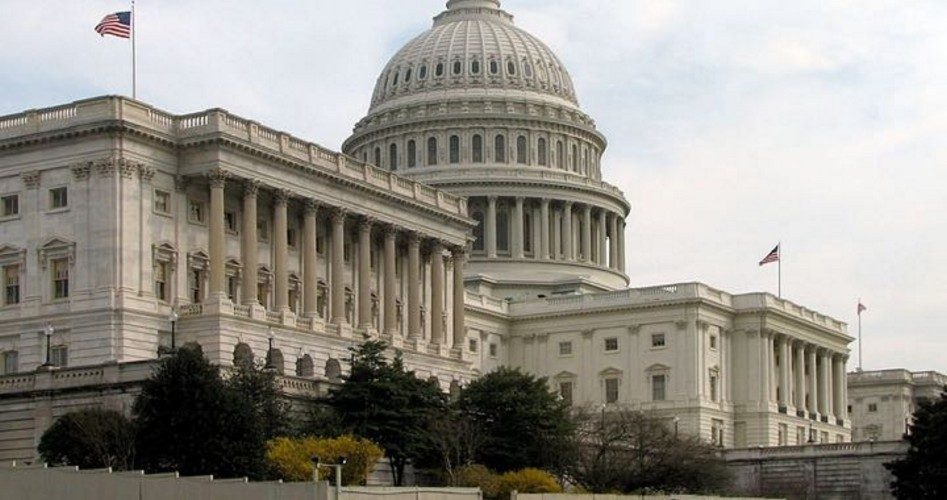
“Time to repeal 17th Amendment. Founders had it right — Senators chosen by state legislatures. Will work for their states and respect 10th amid,” tweeted former Arkansas Governor Mike Huckabee late last week, in calling for the repeal of the 17th Amendment. The 17th Amendment altered the method of Senate election devised by the Founding Fathers from election by their respective state legislatures to direct, popular election, as was already the case with the House of Representatives.
Huckabee was incensed when the Senate failed, 49-51, to vote for the “skinny repeal” of ObamaCare. The so-called skinny repeal would have ended the individual mandate and defunded Planned Parenthood. It was the latest modification or repeal of the so-called Affordable Care Act (popularly known as ObamaCare) to fail to pass in the Senate, despite repeated Republican promises in the 2010, 2012, 2014, and 2016 election campaigns that a Republican House of Representatives, Senate, and White House would do away with ObamaCare.
In this instance, three Republicans — Senator John McCain (Arizona), Lisa Murkowski (Alaska), and Susan Collins of Maine — voted against repeal. Had even one of them voted “yes,” then Vice President Mike Pence, in his capacity as President of the Senate, would have broken the tie, and the bill would have passed.
McCain said it was now time to “return to the correct way of legislating,” which to McCain means receiving “input from both sides of the aisle” among other things. McCain campaigned for reelection promising to repeal ObamaCare, but his decisive vote kept that from happening.
Huckabee had a different take than McCain, as expressed in a second tweet: “CNN reports Dems will give Lifetime Achievement Award to Murkowski Collins and McCain. [Senate Democrat Leader Chuck] Schumer so happy he cried.”
Huckabee’s disgust at the Senate’s failure was the impetus for his tweet calling for the repeal of the 17th Amendment. Huckabee contends that the repeal of the 17th Amendment would return more power to the states, and would lessen the concentration of federal power.
The 17th Amendment was ratified in 1913 during the “Progressive Era.” The progressives were part of a movement that infected both political parties (Republican Theodore Roosevelt and Democrat Woodrow Wilson were both “progressives”). Progressives favored an increase in the power of government, generally, arguing it could solve societal problems, and also favored centralization of governmental power in the hands of the federal government, especially the executive branch.
It was a repudiation of the system created by the framers of the Constitution, who were fearful of increasing power in the hands of the government, especially at the federal level. They envisioned the Senate as a check on federal power, because the senators would be chosen for six-year terms by their respective state legislatures. For example, state legislatures often have to contend with a federal government that takes away more and more power from the states and imposes crushing burdens upon the states. If state legislatures still elected their two U.S. senators, then they would have a much better chance of reining in federal bureaucrats and the rest of the federal government.
As it is, with direct popular election, senators have become little more than glorified House members.
Writing in Federalist, No. 62, James Madison (whose contributions to the federal Constitution crafted in 1787 were so great that he is often called “the father of the Constitution”) said of the provision that left the election of U.S. senators to the respective state legislatures, “It is recommended by the double advantage of favoring a select appointment, and of giving to the State Governments such an agency in the formation of the Federal Government as must secure the authority of the former.”
In other words, senators would be agents of the respective states, designed to “secure” their authority in the federal system created by the Constitution.
Radio commentator Mark Levin suggested the repeal of the 17th Amendment in his book The Liberty Amendments. A few years ago, Levin explained why he thinks repeal of the 17th Amendment is necessary on his radio show: “We now have individuals in the U.S. Senate who have absolutely no allegiance to their states, none.”
“This is not the kind of representation in the Senate that the Framers put in place,” Levin said. “The direct election of senators was part of the progressive movement.… The point was, and there was an enormous amount of debate about this at the constitutional convention, AND in the state ratification conventions, the federalists made the case over and over again, that the states not only had plenary power under the Constitution, and the federal government was limited to specific powers, but the states were right there at the table in Congress in the United States Senate.”
The situation has gotten so bad that most state governments now fund offices in Washington, D.C., to represent their interests to Congress. Sadly, that used to be the function of the Senate, until the passage of the 17th Amendment. Were the 17th Amendment repealed as Levin and Huckabee have suggested, and we returned to the system favored by James Madison, those offices would be unnecessary.
Photo of Senate side of Capitol Building: Scrumshus



